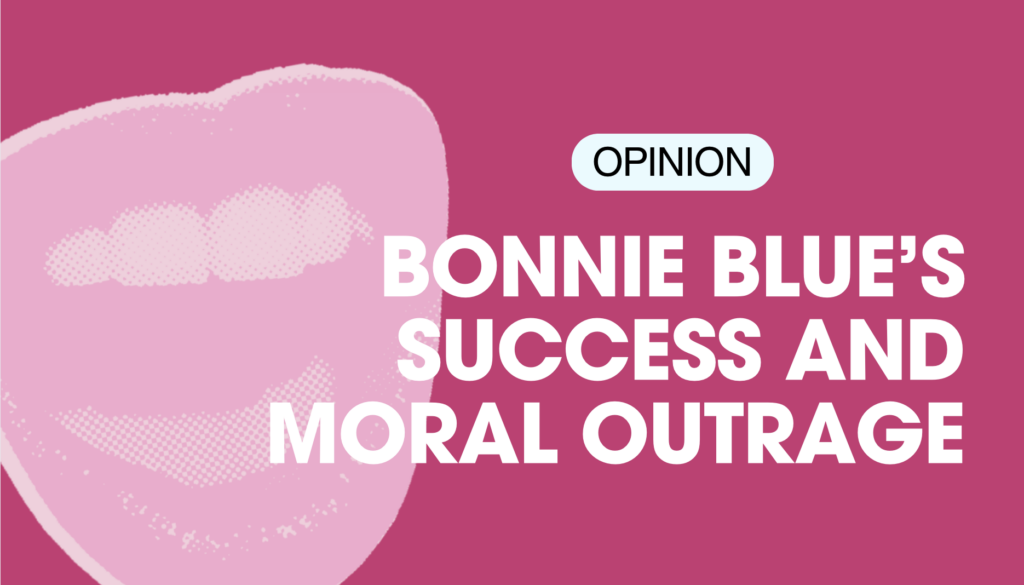Once hailed as the great equaliser, the internet has morphed into an unforgiving arena where public opinion decides your fate.
Platforms like TikTok and Twitter choose clicks over context as their algorithms push increasingly divisive content onto our feeds, agents of cancel culture threaten to strike, and unfiltered hate floods every comment section. For these reasons, many shy away. But in an age where controversy equals currency, others capitalise.
At the centre of the latest internet storm stands Bonnie Blue – 25-year-old adult film star and OnlyFans content creator.
Discourse revolving around sex work and all the ethical implications that come with it isn’t new. What is new is that one creator is single-handedly stirring up such widespread debate. How? Touting herself as a teacher who “wants to educate late teens on how to have fun,” Blue’s controversial niche is having sex with university students and filming it.
No stranger to the spotlight, Blue first made headlines months ago after she paraded UK campuses inviting hundreds of freshers to “bonk” her, and again more recently following stints on several radio shows and podcasts. During her appearances, Blue blamed women for their husbands’ infidelity, shared stories about bedding students’ granddads, and boasted about the millions she’s raking in, earning herself some extreme backlash.
Twitter is awash with hate comments, spurred on by ITV’s This Morning featuring Blue as a guest just last week. One user said: “Bonnie Blue is a glorified predator, making content out of shagging hundreds of virgin freshers when you’re in your mid-20s is disgusting,” while another called for her to be “flogged.”
The rise of Bonnie Blue has sparked some important debates around power dynamics, sexual agency, and exploitation. In short, there’s no denying that Blue’s behaviour could have some damaging repercussions, both for the boys starring in her videos and for young people’s perceptions of sex and relationships. Despite all of this though, directing so much vitriol at one woman is unfair at best, and at worst gravely ignorant to the role we, and the media, play in her success.
ITV’s YouTube clip of Blue’s interview has over 900 comments, many of which asking why ITV would ever platform such a controversial person. The simple answer to that question is money.
The outrage economy that fuels both social and mainstream media has rendered the phrase ‘all press is good press’ truer than ever, and Bonnie Blue knows exactly what she needs to do to create a media circus. When asked by the Metro if she purposefully makes provocative comments, Blue admitted: “Half the things I do, yes, it’s marketing.”
Not only that, The Daily Mail debunked one of Blue’s most controversial videos that featured apparent fathers and sons waiting for their turn in the sex-athon actually featured a lineup of fellow adult performers – a revelation that Blue is yet to deny.
Blue herself has said that much of what she does is PR. Her financial success hinges on the visibility of her content, and letting critics run wild with hatred has proven remarkably profitable. Whichever side you fall on, it’s clear that the morality of Blue’s actions is inconsequential – she’s already won our attention, and thus our wallets.
She hasn’t pulled this off all alone, though. Blue’s rise to fame (or rather infamy) would’ve been impossible without the help of a media landscape that thrives on sensationalism, and even that wouldn’t exist without an audience hungry for scandal.
The podcasters and journalists aren’t naive to the fact that a shocking headline or scandalous soundbite will attract viewers in their droves, generating income not only for themselves but also for Blue, creating a symbiotic relationship driven by the audience’s obsession with drama. The more we engage, the more they’ll put out.
The reasons we’ve ended up with an outrage economy that is so profitable are numerous. Declining journalistic integrity, declining media literacy, publications valuing economics over ethics, and the rise of easily digestible short-form content all feed into a media landscape that can rely on the audience to care about theatrics above all else.
What’s worse is that all of the negative attention directed at Blue doesn’t seem to have hurt her career so far. Despite petitions to revoke her Australian visa, facing deportation from Fiji, and demands to deplatform her altogether, Blue still comes out on top because whether positive or negative, all this attention brings in money.
It’s easy to see why the general public harbours such resentment for Blue, but it’s impossible to ignore the fact that she is just one small cog operating within a system that would’ve exploited her story for profit anyway, so why shouldn’t she take advantage?
Ultimately, Bonnie Blue’s massive success isn’t just a reflection of her controversial marketing tactics; it’s a mirror held up to our culture and the exploitative nature of the mainstream media. Blue might be playing the game, but by continuing to click and comment and criticise, we’re all setting the rules.






Leave a reply